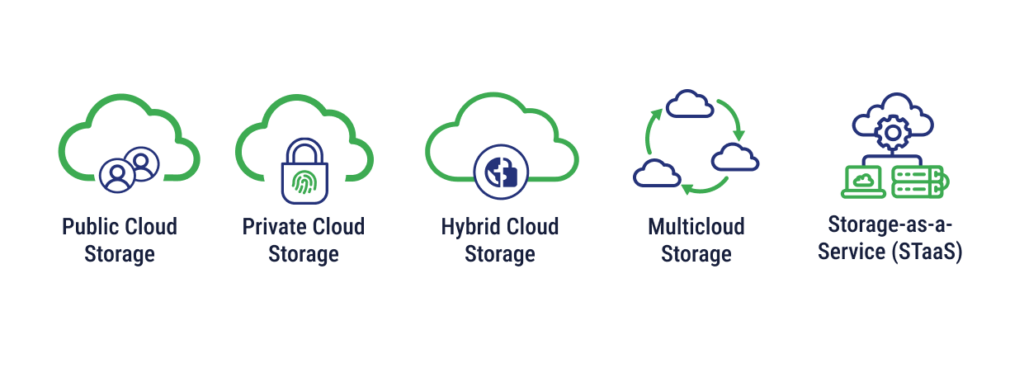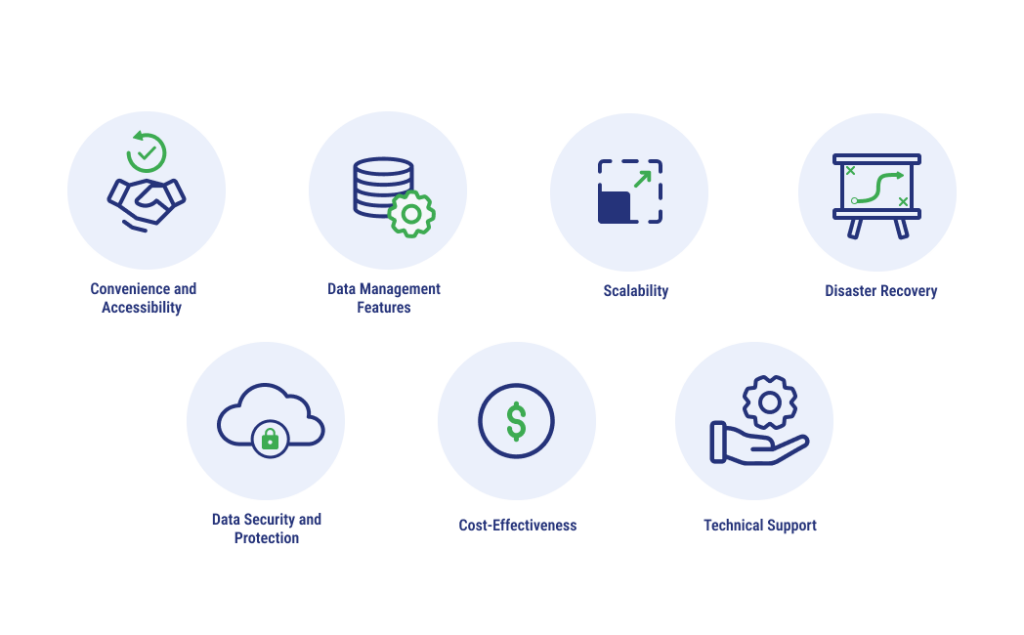
The way businesses access and manage data has been revolutionized by cloud storage. By leveraging cloud storage, organizations can improve scalability, flexibility, and collaboration for team members. However, choosing a cloud storage provider that’s right for your business can be a challenge. In this article, we’ll explain what cloud storage is, the types of storage solutions businesses may use, and considerations when implementing cloud storage at your organization.
What is Cloud Storage?
Cloud storage is a service that allows users to store data on internet-accessible remote servers, as opposed to storing data locally on a computer or another physical device. Because it is being hosted remotely, data stored in the cloud can also be accessed from any device with an internet connection. Some common examples of cloud storage include Dropbox, Google Drive, and Microsoft OneDrive. Businesses may also use services like Amazon S3 or Microsoft Azure Blob Storage.
Types of Cloud Storage Solutions
There are several main types of cloud storage solutions: public, private, hybrid, multicloud, and storage-as-a-service.

- Public cloud storage: According to Flexera’s 2024 State of the Cloud report, 71% of companies surveyed now consider themselves heavy public cloud users, and public cloud storage popularity is no different. Third-party providers, such as Amazon Web Services (AWS) and Google Cloud Platform offer public cloud storage that is easily scalable and priced based on what customers use.
- Private cloud storage: Organizations looking for greater control and security over their storage may opt for private cloud storage, which can either be hosted in an on-premises environment or in a data center owned by a cloud provider. This can be useful for data that is more sensitive in nature and comes with highly specific compliance requirements.
- Hybrid cloud storage: For businesses that need a combination of public and private storage, hybrid cloud storage can be a good option. This allows greater control over sensitive data while leveraging the flexibility of public cloud storage.
- Multicloud storage: Multiple cloud providers can also be used as part of a storage strategy to offer redundancy and avoid vendor lock-in with any particular provider.
- Storage-as-a-Service (STaaS): One of the most flexible storage models can be done as an internet-based service, enabling organizations to manage and access on-demand resources without any upfront costs.
Advantages of Cloud Storage
Regardless of the solution you choose, cloud storage comes with a number of benefits, including convenience, scalability, data security, cost-effectiveness, and data management features.

Convenience and Accessibility
Cloud storage can be accessed from any device with an internet connection and can also come with offline storage for critical files. Users can manage their data through easy interfaces and don’t have to worry about maintaining and managing physical storage devices in-house.
Data Management Features
When data is saved in cloud storage solutions, it’s straightforward to back up and restore, especially with services that offer built-in redundancy. Cloud storage also makes version control simple, tracking changes to files and allowing restoration of previous versions. Most cloud storage solutions also come with search and indexing features, allowing businesses to quickly find specific data. Data stored in cloud computing environments can also be conveniently shared with others for easy access and collaboration during key projects.
Scalability
Without the restriction of physical storage space, businesses are able to increase or decrease capacity as needed, automatically scaling resources on demand. The pay-as-you-go capabilities, particularly in public cloud and STaaS solutions, mean organizations can avoid paying for storage they don’t use.
Disaster Recovery
Redundancy involves having data saved in more than one location in case recovery is needed after a disaster. Cloud storage can replicate data across data centers and minimize downtime when businesses experience an outage, data breach, or other disaster.
Data Security and Protection
Other data security and protection methods common to cloud storage include encryption at rest and in transit, access controls to limit who can access what data, ransomware protection with immutable snapshots, and compliance with common industry standards and regulations such as GDPR, HIPAA, and SOC 2.
Cost-Effectiveness
Because most cloud storage is based on a pay-as-you-go model, it can be cost-effective and reduce the amount of excess spend from unused resources. Businesses may also be able to pay for reserved quantities of data they know will be used long-term to save on monthly costs. Cloud storage reduces costs related to capital expenditures as well.
Technical Support
With third-party cloud storage solutions, businesses have access to 24/7 technical support and are guaranteed certain levels of performance and uptime through service level agreements (SLAs).
Disadvantages of Cloud Storage
While cloud storage can be a great option for many businesses, it’s also important to be aware of potential disadvantages, including cybersecurity threats, encryption challenges, risks associated with misconfiguration, challenges with regulations, and vendor lock-in. This can be particularly difficult for data stored in hybrid or multicloud settings, which are more susceptible to higher data breach costs and longer breach lifecycles. To reduce risks, it’s best to choose a managed services provider who can help you configure your storage environment following best practices.
Cybersecurity Threats
Businesses need to understand their responsibility in keeping their data safe in relation to the responsibilities of the cloud provider. Compromised credentials, misconfigurations, and other vulnerabilities on the customer side can lead to unauthorized access to sensitive data. Team members may unknowingly welcome malicious software that targets cloud storage systems or may fall victim to phishing attacks that reveal sensitive information. Cloud storage can also be targeted by insider attacks, employees and contractors with malicious intent.
Misconfiguration Risks
Even though cloud storage can be easy to set up, it’s important that team members familiar with key configurations have a major hand in configuring an organization’s cloud storage solutions. Incorrect settings and permissions can expose sensitive data to bad actors.
Encryption Challenges
Encryption can also be a setting that can be misconfigured if not well understood. Businesses need to work with experts who are well-versed in encryption algorithms and what can be done to protect cloud storage environments from vulnerabilities.
Compliance and Regulatory Challenges
Cloud providers meet many of the basic standards for common regulatory requirements. However, businesses with niche compliance needs or highly sensitive information may find that cloud storage solutions don’t have the level of security and data protection they require or would prefer.
Potential for Vendor Lock-in
If a business relies too heavily on one cloud provider for storage, it can be hard to switch to another, especially if there are key differences between features or services that make migration difficult. Organizations may have difficulty optimizing costs if switching to a new vendor would require a lot of additional time and resources.
Considerations When Choosing Cloud Storage
Once you’ve understood the features of different cloud storage platforms and your business’s responsibility for keeping data safe in the cloud, it’s time to choose the cloud storage solution that’s right for you.
Storage Capability and Scalability
Different data and workload requirements will make different storage types well-suited for your business. For example, object storage can store large amounts of unstructured data, like images and documents, whereas block storage is better for storing structured data, such as server operating systems and databases. File storage allows for file-level access to data.
In addition to storage types, the storage solution you choose should also accommodate future growth and be adequately scalable for your current and anticipated workload requirements.
Integration Capabilities
How easy will it be to integrate your cloud storage solution with existing applications and systems? This may be something you need to accomplish using APIs or third-party, pre-built integrations. Consult the API documentation of the cloud storage solutions you’re considering to better understand how the storage will integrate with current applications, paying particular attention to factors like authorization, authentication, and data transfer protocols.
Cloud Compatibility
The cloud storage solution you choose should also work well with whatever cloud the data will be stored in. Some cloud providers offer storage solutions, but you may also choose a third-party provider to work with your current cloud platform. Businesses that have a hybrid or multicloud environment should verify compatibility across different cloud platforms.
Costs
A common pricing model for cloud storage is pay-as-you-go, making it fitting for unpredictable workloads. Businesses can also use reserved instances for specific storage capacities to take advantage of discounted rates. Another cost businesses may not consider can apply to data transfer, moving data in and out of the cloud storage solution. This can add up for large datasets that transfer frequently.
Other associated costs can come from features like analytics, data encryption, replication, and lifecycle management. Data retention policies may make storage costs more expensive, depending on the number of years required to keep data and ensure compliance.
Security Features
Understand what security features cloud providers offer, including:
- Encryption: Data should be encrypted at rest when stored on servers and in transmit when it’s between applications and the cloud storage solution.
- Access Controls: User roles and permissions can be set to restrict access to data. Identity and access management (IAM) can be used to manage privilege levels and user accounts.
- Compliance: Understand the industry standards and regulations each cloud provider complies with, or what additional settings are necessary to achieve compliance.
Compliance
Compliance can include meeting specific regulatory requirements, offering data residency in specific geographic locations, and providing detailed audit trails to document data access activity and changes.
Need Help Exploring Cloud Storage?
If cloud storage is on your list of upcoming projects, you’re in the right place. TierPoint’s Storage as a Service (STaaS) offering can take the guesswork out of cloud storage. We offer subscription-based billing, seamless scalability, and robust ransomware protection. Our hybrid cloud storage gives organizations the control and scalability they need without worrying about managing cloud storage complexities.

